Generation Z After Graduation: Redefining Work Standards, for Better or Worse
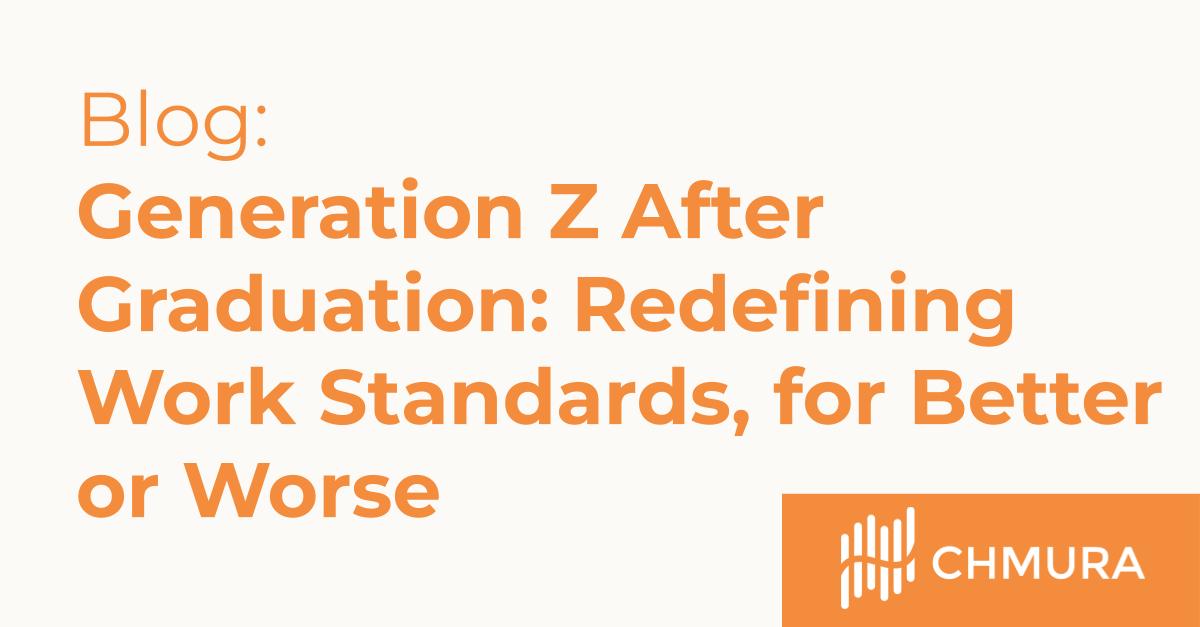
As graduation season comes to a close, Gen Z and employers juggle ambitions and values.
Generation Z, born between 1997 and 2012,[1] currently makes up over a fifth of the U.S. population and is projected to account for 30% of the nation’s civilian labor force by 2030.[2] Ranging in age from 11 to 26 in 2023, many have been in the workforce for a few years now, while others are exiting postsecondary education institutions ready to make their mark on the workplace.
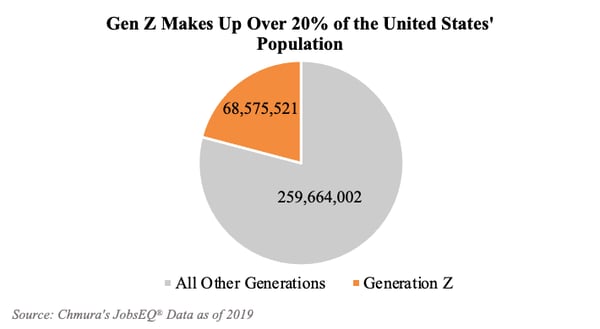
The question, however, of whether their mark will scar the workplace or enhance it remains to be seen. As Gen Z emerges as a significant portion of the population and labor force, it is important to understand generational differences between this group and other generations, and how that may impact the future of the workplace.
The current labor force participation rate among Gen Zers ages 20 to 24 is 71%, roughly four percentage points lower than Millennials and six percentage points lower than Gen X when they were in the same age range (see figure below). This trend is also persistent in Gen Zers ages 16 to 19 with a current participation rate of 35.9%, roughly five percentage points lower than Millennials and 15 percentage points lower than Gen X when they were in the same age range. Explanations such as pursuing higher education,[3] seeking nontraditional work, and opting to postpone looking for work to seek other fulfillment may partially explain this trend.
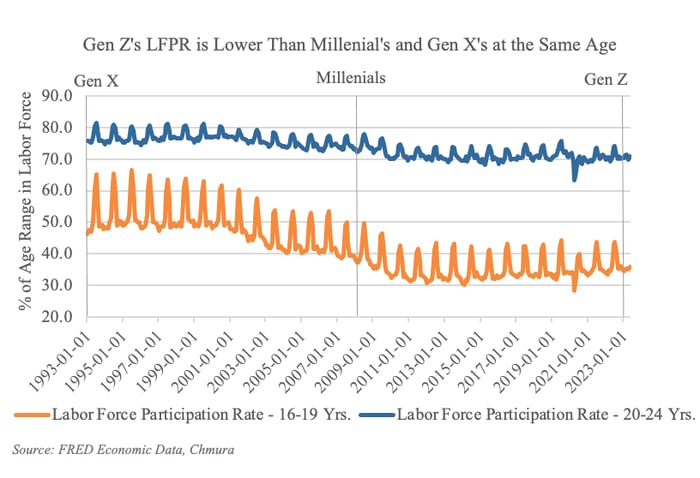
In addition, some articles suggest that Gen Zers change their career more often than other generations. For instance, LinkedIn’s Workforce Confidence survey shows 25% of Gen Z respondents say they hope to or intend to leave their current occupation within the next six months, higher than other generations.[4] Additionally, Bank of America reported 25% of its customers in the Gen Z age group having changed jobs over the past 6 months, with an associated average pay increase of 30%.[5]
After accounting for different phases of life, however, Gen Z’s workforce behavior and wage increases are consistent with previous generations. Gen Zers turnover rate is higher than other generations because other generations have been in the labor force longer and are more likely to have found a role that matches their skills and values. In fact, Quarterly Workforce Indicators (QWI) from the Census Bureau reveal that Gen Z job turnover is only marginally higher than that of Millennials when they were the same age, as shown in the figure below. Moreover, transitional periods like graduation may explain the increase in wages as Gen Zers move from part-time roles (i.e., fast food worker, cashier, server, babysitter, etc.) to higher paying jobs requiring high school/college degrees or trade certifications.
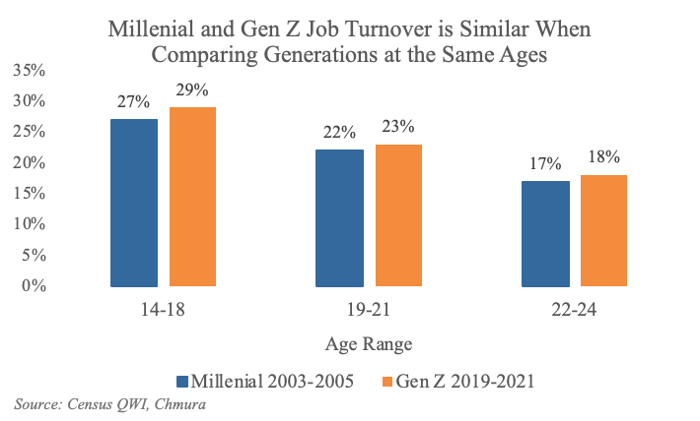
Employers, however, are still not enthused with Gen Z workers. ResumeBuilder surveyed 1,344 managers and business leaders – 74% of which stated that Gen Z is more difficult to work with than other generations.[6] They found that Gen Z lacks technical skills, effort, and motivation, and gets too easily offended. Of course, these complaints are often levied at any incoming generation, such as the supposed “lax work ethic” of Millennials.[7} When considering Gen Z’s circumstances in the workplace, they report being more unengaged, stressed, and burnt out than other generations.[8]
Based on studies from marketing and consulting firms that regularly survey different generations, the following are some suggestions to help bridge the discrepancy between employers’ and Gen Z’s expectations.
For Employers
A survey of 1,509 Gen Zers, conducted by Ernst & Young (EY), suggests salary alone is not enough to draw Gen Z workers in or retain them.[9] Employer prominence also can’t be counted on--RippleMatch’s data show company prestige ranking as the least important factor to Gen Z’s job search.[10] For these reasons, employers seeking to attract and retain Gen Zers should heavily consider Generation Z’s values. In addition to pay, a Deloitte survey found that a majority of Gen Z deeply values diversity, environmental consciousness, and flexibility.[11] Companies can attract Gen Z workers by cultivating a culture that embraces diverse perspectives across their training, business values, and marketing.[12] Employers may also consider prioritizing wellness and mental health to show they care and to mitigate burnout.[13] To do this, they can improve access to mental health services, be empathetic in their leadership, and curate a stigma-free work culture where employees feel comfortable addressing any problem at work.
Rather than merely preferences in the workplace, some Gen Zers have adopted these values as expectations, and nearly two in five are willing to walk away to find other roles if their needs aren’t met.[14] What may seem like entitled behavior may be their way of communicating employer failure to meet demands of life following the global pandemic.
For Gen Z
As a Gen Z intern, I recognize the need to align my values with opportunities to grow in the workplace. Gen Z needs to understand professional skills and company culture even as they look to challenge or change it. They also need to develop stronger interpersonal communication skills and be open to feedback. By doing so, Gen Z can pave the way for the independence and influence they seek in their work environment.
Using JobsEQ to Find Work Opportunities
As Gen Zers graduate from high school or college and move into the workforce, analytical tools to explore occupation deficits, compare wages within and between regions, and identify the best alternative career paths to pursue based on skills and wages would be helpful. JobsEQ® can help employers, employees, and students explore these trends and more, including directly linking to job openings.
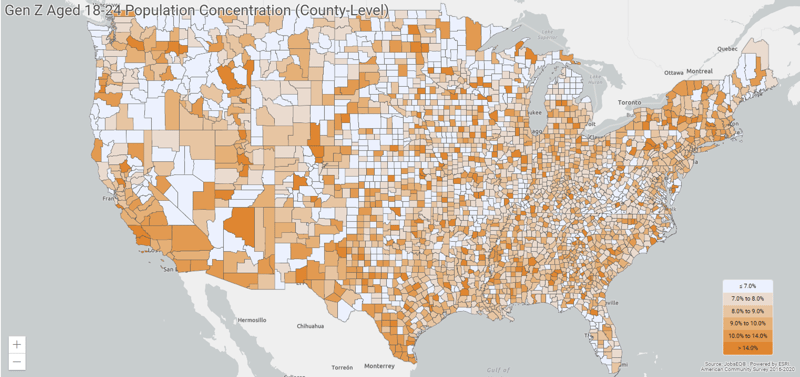
To investigate where Gen Z graduates may have the most potential impact on the workplace, the Maps feature of Chmura’s JobsEQ® was used to produce a population density map of Gen Zers aged 18 to 24. For more information about how JobsEQ can help you understand population dynamics and the impact of demographics on the labor force of your region, contact us.
--------------------------------------------
[1] Source: https://www.pewresearch.org/short-reads/2019/01/17/where-millennials-end-and-generation-z-begins
[2] Source: https://news.darden.virginia.edu/2022/08/10/its-time-to-get-to-know-gen-z/
[3] Source: https://www.aecf.org/blog/generation-z-and-education
[4] Source: https://www.linkedin.com/pulse/gen-z-boldest-generation-its-job-hunt-priorities-off-charts-anders/
[5] Source: https://business.bofa.com/content/dam/flagship/bank-of-america-institute/economic-insights/who-is-benefiting-from-the-us-labor-market-may-2022.pdf
[6] Source: https://www.resumebuilder.com/3-in-4-managers-find-it-difficult-to-work-with-genz/
[7] See, for example, https://www.washingtonpost.com/wp-dyn/content/article/2010/04/02/AR2010040201452.html?hpid=topnews
[8] Source: https://www.gallup.com/workplace/404693/generation-disconnected-data-gen-workplace.aspx
[9] Source: https://www.ey.com/en_us/consulting/is-gen-z-the-spark-we-need-to-see-the-light-report
[10] Source: https://ripplematch.com/insights/a-comprehensive-look-at-what-generation-z-wants-in-the-workplace-fa808ac0/
[11] Source: https://www.deloitte.com/global/en/issues/work/content/genzmillennialsurvey.html
[12] Source: https://www2.deloitte.com/us/en/pages/consumer-business/articles/understanding-generation-z-in-the-workplace.html
[13] Source: https://joinhandshake.com/blog/employers/6-things-gen-z-wants-from-their-job/
[14] Source: https://www.deloitte.com/global/en/issues/work/content/genzmillennialsurvey.html
Subscribe to the Weekly Economic Update
Subscribe to the Weekly Economic Update and get news delivered straight to your inbox.











